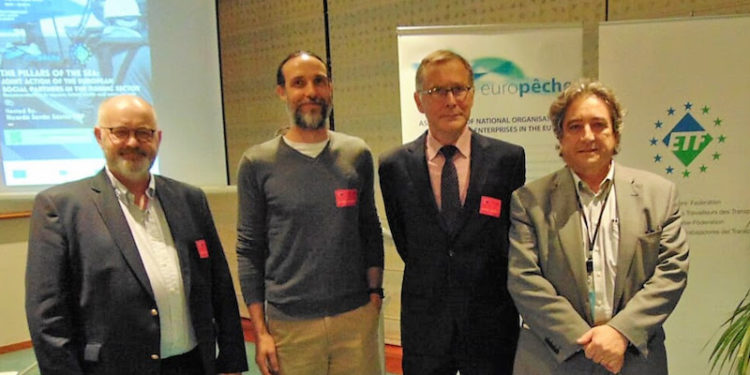European fishing body Europêche has hosted an event at the European Parliament together with ETF and MEP Ricardo Serrão Santos to present our legal proposals for a safer, healthier and more worker-friendly fisheries sector in Europe.
The event brought together a wide range of fisheries stakeholders, including representatives of the EU Institutions, industry and civil society with the aim to present and disseminate the results of the EU co-funded Pillars of the Sea project: Joint action of the European Social Partners in the fishing sector.
Safety and health at sea have always been a top priority for both partner organisations involved in the project. With this project the aim was to propose concrete improvements to the EU legal framework that could offer better health, working conditions and safety at sea for Europe’s fishermen.
‘Building on our years of close collaboration and cooperation, we pooled our knowledge and called on the professional expertise a legal expert in social affairs, a naval architect and the French Maritime Institute of Prevention. We were then able to put forward legal recommendations to really improve in fishermen’s health and safety at work,’ A Europêche spokesman said.
Recommendations
Europêche’s recommendations are that EU policymakers should transpose STCW-F into European legislation to support greater safety at sea, propose alternative ways to measure fishing capacity which do not limit improvements in working and living conditions on board fishing vessels, and set a clear set of common rules for the commercialisation and safe use of deck machinery. These measures are seen as ways to help minimise potential threats to safety of life during fishing operations, increase comfort and also improve the attractiveness of the industry for young people in the EU.
‘Sustainable fisheries require good working conditions, high levels of safety, environmental protection and operational efficiency. Safety at sea is therefore paramount and everyone’s responsibility. As legislators, we should spare no effort to prevent any accident from happening and ensure that our fishers operate under the best possible safety and working conditions,’ said MEP Ricardo Serrão Santos.
Aligning policy and standards
‘The safety of human life must be at the forefront of EU legislation to ensure its protection as part of sustainable fishing. For this purpose, EU policies must be aligned with international standards on training and certification. It would be a huge step forward transposing into European legislation the STCW-F Convention, as recommended in my report. This instrument would bridge the legal gaps at EU level on harmonised training standards, recognition of certificates and free movement of workers,’ commented Ment van der Zwan, spokesman of the employers’ group in the Social Dialogue and author of one of the studies, adding that efforts made by the European Parliament to place safety at sea at the core of the Common Fisheries Policy are appreciated.
‘We invite policymakers to transpose the policy recommendations provided in these studies into legislative realities to make progress on the social dimension of fisheries and ensure a true level of sustainability in the EU,’ said Fleming Smidt, workers’ spokesman in the EU social dialogue committee on sea fisheries as he concluded the meeting.









